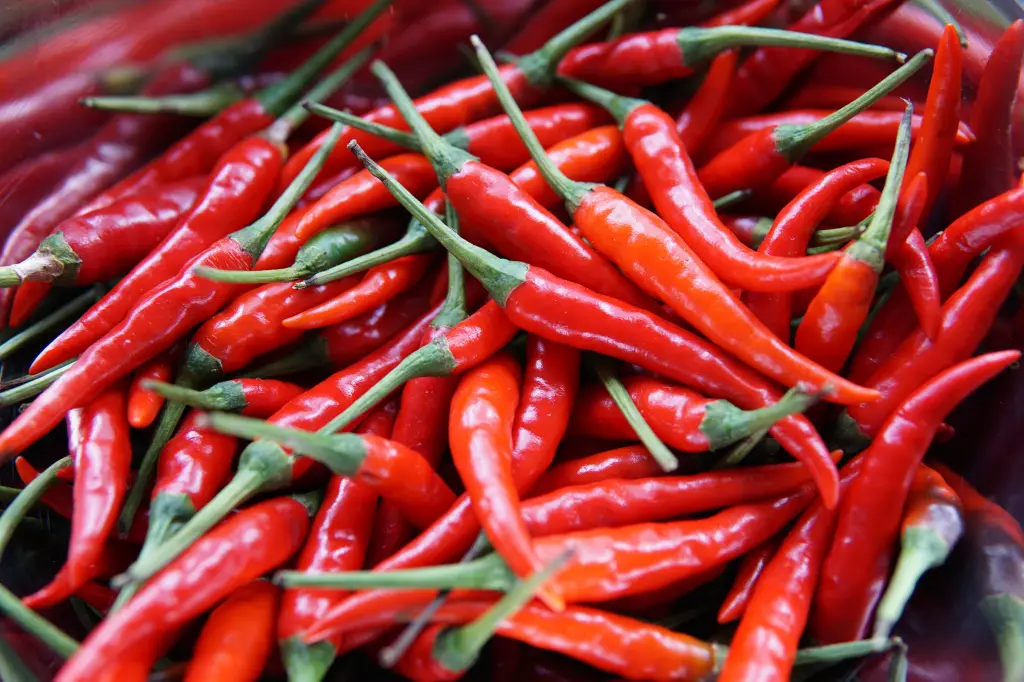The Journey of Red Chilli Peppers: From Nigerian Farmers to Global Buyers
The Journey of Red Chilli Peppers: From Nigerian Farmers to Global Buyers
Spicy, fiery, and undeniably addictive – red chilli peppers have taken the world by storm with their tantalizing flavors. But have you ever wondered about the journey these little red powerhouses take from Nigerian farmers to global buyers? Prepare to be enthralled as we delve into the fascinating story of how these humble crops transform into a global sensation, igniting taste buds and fueling culinary creativity across continents. Join us on this captivating adventure as we uncover the secrets behind the rise of red chilli peppers – straight from the fields of Nigeria to your dining table.
Introduction to Red Chilli Peppers and Nigerian Agriculture
Introduction:
Red chilli peppers are a staple ingredient in Nigerian cuisine, adding spice and heat to many traditional dishes. But beyond its culinary uses, red chilli peppers also play a significant role in Nigerian agriculture and economy. In this section, we will delve into the journey of red chilli peppers from the hands of Nigerian farmers to the plates of global buyers.
History of Red Chilli Peppers in Nigeria:
Red chilli peppers have been cultivated in Nigeria for centuries and are believed to have originated from Mexico. They were introduced to Nigeria by Portuguese traders during the 16th century and quickly became an essential crop due to their adaptation to the tropical climate and high demand as a seasoning agent.
Nigerian Agriculture and Red Chilli Pepper Production:
Agriculture is one of the main sources of livelihood for Nigerians, with over 70% of its population engaged in farming activities. The country’s diverse climate conditions offer ideal growing conditions for various crops, including red chilli peppers.
The major producing states for red chilli pepper in Nigeria include Kano, Jigawa, Bauchi, Gombe, Borno, Yobe, Adamawa Taraba and Sokoto. These states not only have suitable weather conditions but also possess fertile land that provides abundant nutrients for the growth of high-quality red chilli peppers.
The Process of Growing and Harvesting Red Chilli Peppers in Nigeria
The process of growing and harvesting red chilli peppers in Nigeria is a laborious yet highly rewarding journey for the farmers. It involves various stages, from preparing the land to harvesting the ripe, fiery peppers. Let’s take a closer look at each step in this process.
1) Land preparation: The first step in growing red chilli peppers is to prepare the land for cultivation. This involves clearing any existing vegetation and tilling the soil to make it suitable for planting. In Nigeria, farmers often use traditional methods such as hand tools or animal-drawn plows for this task.
2) Seed selection and sowing: Once the land is prepared, farmers select high-quality seeds from their previous harvest or purchase them from local markets. In recent years, there has been a shift towards using hybrid seeds that are known to produce higher yields. The selected seeds are then sown either manually or by using seed drills.
3) Watering and fertilization: Red chilli pepper plants require regular watering to thrive in Nigeria’s hot and dry climate. Farmers use irrigation systems like drip irrigation or sprinklers to provide adequate moisture to the plants. Additionally, they also apply organic fertilizers such as manure or compost to enhance soil fertility and promote plant growth.
How Wigmore Trading Sources Red Chilli Peppers from Local Farmers
Wigmore Trading is committed to supporting and empowering local farmers in Nigeria by sourcing their produce directly from them. This not only helps in building a sustainable agricultural economy but also ensures the highest quality of produce for our customers. One such product that we source from local farmers is red chilli peppers.
Nigeria is one of the top producers of red chilli peppers in the world, with Kaduna state being the largest production center. At Wigmore Trading, we have established strong partnerships with small-scale farmers in Kaduna and other regions across Nigeria to ensure a steady supply of high-quality red chilli peppers.
The process of sourcing red chilli peppers from these farmers starts with identifying reliable and experienced ones who follow strict farming practices. Our team visits these farms regularly, inspecting the crops and monitoring the entire cultivation process to ensure that they meet our standards.
We work closely with these farmers, providing them with necessary training on modern farming techniques, good agricultural practices, and proper handling of produce. This not only improves the quality of our sourced chillies but also enhances the livelihoods of these local farmers.
Once harvested, the red chilli peppers are carefully handpicked by trained workers to ensure that only ripe and unblemished ones are selected. Quality control measures are strictly followed at every step to maintain consistency in taste, color, and size.
The Importance of Quality and Sustainability in Pepper Farming
Pepper farming is an essential aspect of agriculture in Nigeria, with the country being one of the leading producers and exporters of red chilli peppers. However, beyond its economic significance, there is a growing emphasis on the importance of quality and sustainability in pepper farming practices.
Quality refers to the characteristics or attributes that make a product desirable for consumption. In the case of red chilli peppers, quality encompasses aspects such as appearance, flavor, aroma, and nutritional value. Producing high-quality peppers requires careful attention to every stage of the farming process – from seed selection and planting to harvesting and post-harvest handling.
One of the key factors that contribute to quality in pepper farming is soil health. Healthy soil provides essential nutrients for plant growth and helps protect against diseases and pests. Therefore, it is crucial for farmers to use sustainable practices such as crop rotation, intercropping, composting, and minimal tillage to maintain healthy soil.
Another critical factor in ensuring high-quality peppers is proper irrigation management. Peppers require consistent moisture levels throughout their growing period; too much or too little water can affect their size, color, taste, and overall quality. Farmers must carefully monitor irrigation systems and adjust them accordingly based on weather conditions.
Exporting Red Chilli Peppers: Challenges and Solutions
Exporting Red Chilli Peppers: Challenges and Solutions
The demand for red chilli peppers has been steadily increasing in recent years, with the global market estimated to be worth over $2 billion. As a result, more and more farmers in Nigeria are turning to this crop as a means of income generation. However, exporting red chilli peppers from Nigeria to global buyers comes with its own set of challenges. In this section, we will discuss some of the key challenges faced by Nigerian farmers in exporting red chilli peppers and explore potential solutions.
1. Quality Control:
One of the biggest challenges in exporting red chilli peppers is ensuring consistent quality throughout the supply chain. Global buyers have high standards when it comes to the quality of produce they import, and any deviation can result in rejected shipments or decreased demand for future orders. This poses a significant challenge for Nigerian farmers who may not have access to modern farming techniques or proper storage facilities.
Solution: To overcome this challenge, farmers can invest in training programs that educate them on best practices for growing and harvesting red chilli peppers. They can also work closely with agricultural experts or cooperatives that provide guidance on quality control measures such as proper handling and packaging techniques.
The Impact of Global Demand on Nigerian Pepper Farmers
Nigeria is the largest producer of red chilli peppers in Africa, accounting for over 30% of the continent’s total production. With its ideal climate and fertile soil, Nigeria has been able to cultivate high-quality peppers that are in high demand globally. However, the journey of Nigerian pepper farmers has not been without its challenges, especially when it comes to meeting the ever-increasing global demand.
The global demand for red chilli peppers has been on the rise due to their versatile use in various cuisines and as a key ingredient in many popular spices. This increasing demand has led to a significant increase in export opportunities for Nigerian pepper farmers, making it an important source of income for many rural communities.
One of the major impacts of global demand on Nigerian pepper farmers is the shift towards commercial farming. Traditionally, pepper farming was done on a small scale by subsistence farmers who grew just enough for their own consumption or local markets. However, with the increasing demand from international buyers, more and more farmers are now transitioning into commercial farming to meet this demand.
This change in farming practices has brought about numerous benefits for Nigerian pepper farmers. It has created employment opportunities and increased income levels within rural communities. As more farmers enter into commercial farming, there is also an increase in productivity due to better access to resources such as improved seeds, fertilizers, and modern farming techniques.
Tips for Buying and Using Red Chilli Peppers from Nigeria
Red chilli peppers from Nigeria are known for their vibrant color, intense heat and unique flavor. They have been a staple ingredient in Nigerian cuisine for centuries and are now gaining popularity around the world. If you are interested in buying and using red chilli peppers from Nigeria, here are some tips to help you get the best out of these spicy gems.
1. Know the Different Varieties: Before purchasing red chilli peppers from Nigeria, it is important to know that there are different varieties available. The most common ones include Tatashe, Rodo and Ata Rodo. Tatashe is milder in flavor and is often used in stews and soups, while Rodo has a higher heat level which makes it perfect for spicing up dishes like Jollof rice. Ata Rodo is the hottest variety and can be used sparingly to add a kick of heat to any dish.
2. Buy From Reputable Sources: When buying red chilli peppers from Nigeria, it is important to ensure that you are getting them from reputable sources. This will guarantee that you are getting high-quality produce that has been grown without harmful chemicals or pesticides. Look for certified organic producers or farmers who have a good reputation within the local community.
Conclusion: Supporting Local Farmers
Conclusion: Supporting Local Farmers
The journey of red chilli peppers from Nigerian farmers to global buyers has been a long and challenging one. However, it is also a story of resilience, determination, and hard work. Through their perseverance, Nigerian farmers have successfully established themselves as reliable suppliers of high-quality red chilli peppers to the international market.
One of the main takeaways from this journey is the importance of supporting local farmers. By choosing to buy from these small-scale farmers, we are not only getting fresh and authentic produce but also contributing to the growth and sustainability of their communities.
Local farmers play a crucial role in ensuring food security and reducing poverty in developing countries like Nigeria. They provide employment opportunities for thousands of people and contribute significantly to the country’s economy. By supporting them, we are also promoting sustainable agriculture practices that are essential for preserving our environment.
Moreover, buying directly from local farmers means cutting out middlemen and ensuring fair prices for their hard work. This helps in empowering these farmers financially and providing them with a stable source of income.
Additionally, by purchasing locally grown produce, we reduce our carbon footprint by minimizing transportation costs and emissions associated with importing goods from other countries. This contributes positively towards tackling climate change.
Furthermore, by supporting local farmers, we can also preserve traditional farming techniques and promote crop diversity. These methods have been passed down through generations and help maintain soil fertility without relying on harmful chemicals or pesticides.








Comments are closed.